Friday's wise wordspublished at 09:03 GMT 11 January 2019
Our proverb of the day:
Quote MessageBefore a bird flies off I've counted the eggs in its belly."
A Krio proverb sent by Ahmid in Waterloo, Sierra Leone
The telecommunication giant was accused of illegal transfer of funds
Five killed in DR Congo post-election clashes
Ouattara calls for West African political union
Sudan police fire tear gas at protesters
'Jailing fraudsters won't recover Mozambique money'
South African school denies being racist
Wanted Ghana gold dealer 'seeking money abroad'
Our proverb of the day:
Quote MessageBefore a bird flies off I've counted the eggs in its belly."
A Krio proverb sent by Ahmid in Waterloo, Sierra Leone
Welcome back to BBC Africa Live where we will bring you the latest news and analysis from around the continent.
We'll be back on Friday
BBC Africa Live
Farouk Chothia
That's it from BBC Africa Live after a momentous day in the Democratic Republic of Congo. We'll be back on Friday. In the meantime, stay in touch by listening to the BBC Africa Today podcast or checking the BBC News website.
Here's a reminder of Thursday's wise words:
Quote MessageA hen cannot scratch for food with her two legs simultaneously."
Sent by Jacob Dior Macueng, Rumbek, South Sudan
Click here to send us your African proverbs
And we leave you with this photo of a supporter of Felix Tshisekedi, the first-ever opposition candidate to be declared the winner of a presidential election in DR Congo - a country roughly the size of Western Europe:
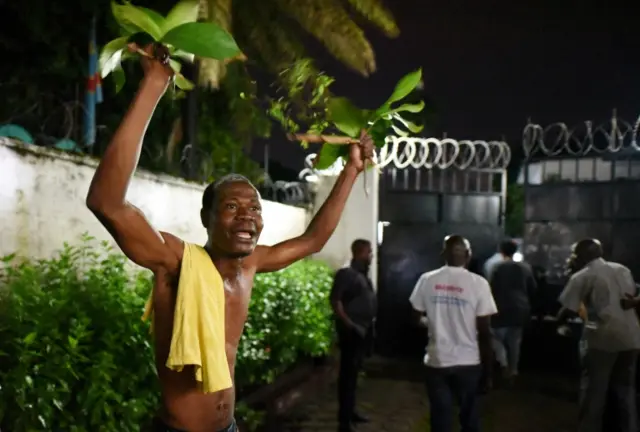 Image source, Reuters
Image source, Reuters Will Ross
Will Ross
Africa editor, BBC World Service
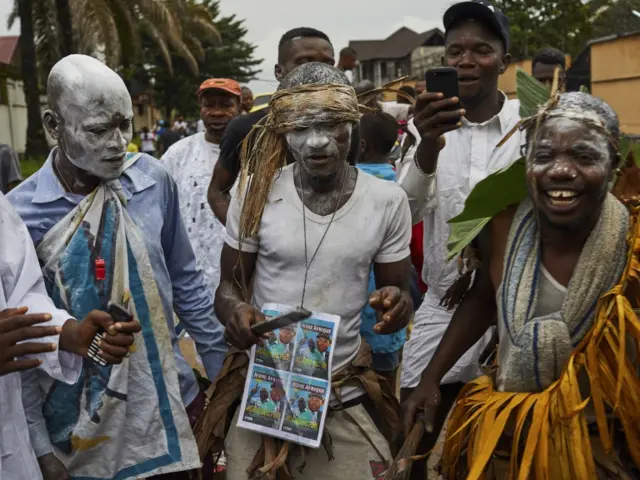 Image source, EPA
Image source, EPASupporters of Felix Tshisekedi have no doubt he won
Usually within hours of the announcement of an electoral result, even a rigged one, the congratulatory messages from foreign leaders start trickling in.
But so far there have only been calls for calm in the Democratic Republic of Congo and for the full list of results to be made public so that a proper assessment can be made on whether opposition leader Felix Tshisekedi really won the presidential election.
The fact that outgoing President Joseph Kabila’s chosen successor, Emmanuel Shadary, was resoundingly rejected by the electorate will be seen by some as a sign that there has been a degree of democracy in action in DR Congo.
But the influential Catholic Church, which says it had 40,000 election observers across the country, has fuelled the belief that the electoral commission is far from independent.
It said the official result does not match its findings. Another opposition candidate, Martin Fayulu, says he won and has condemned the official result as an "unacceptable electoral scam".
So, the opposition's inability to unite behind one candidate appears to have played into President Kabila's hands, and he may remain hugely influential long after a final verdict is given on this chaotic poll.
The UK's Foreign Secretary Jeremy Hunt has added his voice to doubts about the credibility of Felix Tshisekedi's victory in the Democratic Republic of Congo's presidential election.
He tweeted that the result will be discussed by the UN Security Council on Friday:
Allow X content?
This article contains content provided by X. We ask for your permission before anything is loaded, as they may be using cookies and other technologies. You may want to read X’s cookie policy, external and privacy policy, external before accepting. To view this content choose ‘accept and continue’.
Analysis
Moses Rono
BBC Monitoring
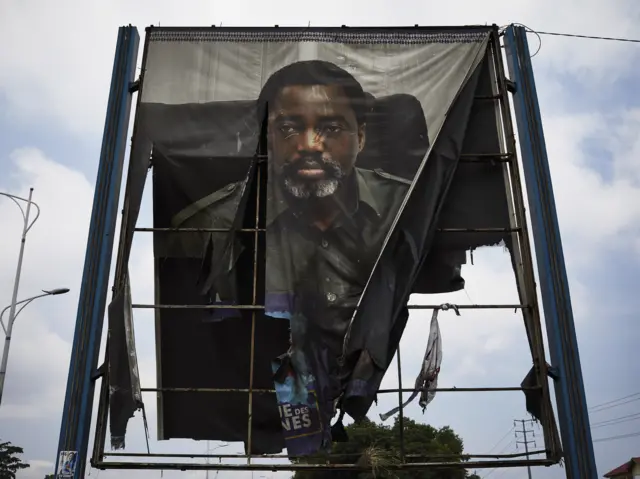 Image source, EPA
Image source, EPAJoseph Kabila has ruled in DR Congo for 18 years
Allegations that the Democratic Republic of Congo's President Joseph Kabila cut a deal with opposition candidate Felix Tshisekedi to deny another opposition candidate, Martin Fayulu, victory has raised concerns about the legitimacy of the result.
A statement by the influential Catholic Church that the result does not reflect the data its observers collected from polling stations will lend credibility to claims of a backroom deal.
Mr Fayulu, who has rejected the result, has limited choices, unless the Catholic Church and civil society groups mobilise support for him.
The Constitutional Court - which barred Mr Kabila’s fiercest opponents, former Vice-President Jean-Pierre Bemba and former regional governor Moise Katumbi, from contesting the election - is seen as loyal to the outgoing president.
If Mr Tshisekedi assumes power, some of his legitimacy will be eroded because of the suspicion that he struck a deal with Mr Kabila.
There is the risk of a long-drawn political dispute - and unrest - in a country which has so far never had a peaceful transfer of power.
 Louise Dewast
Louise Dewast
Kinshasa, DR Congo
This is a historic moment for the opposition in the Democratic Republic of Congo, who for decades had failed to seize power.
For many, this is finally the time for change. And supporters of President Joseph Kabila are praising his willingness to hand over power.
But the challenges facing the next president are immense - and some are doubting Felix Tshiskedi’s independence and his ability to govern.
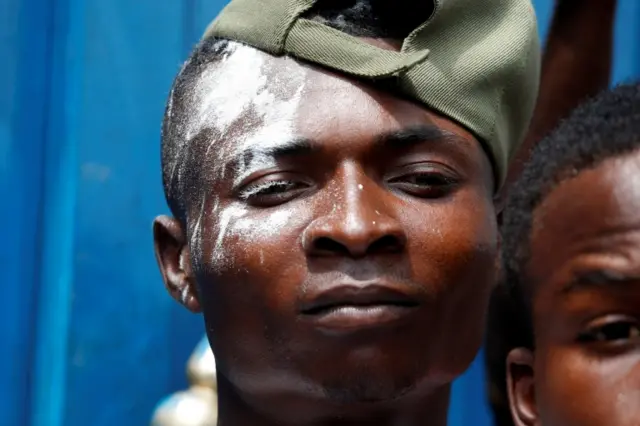 Image source, Reuters
Image source, ReutersSupporters of Felix Tshisekedi believe history is in the making
Political analyst Albert Moleka believes Mr Kabila will try and stay influential behind the scenes.
"He still doesn’t want to go. He wants to have a control of the system," Mr Moleka said.
While the ruling party's candidate Emmanuel Shadary has conceded, Martin Fayulu, the losing opposition candidate, has rejected the result and is likely to lodge an appeal in the Constitutional Court.
So pressure will be on the judges, who will make a ruling on any challenges and announce a final winner.
With the Roman Catholic Church in the Democratic Republic of Congo casting doubts on the credibility of the presidential election result, BBC Africa editor Fergal Keane writes about its influence in the central African state:
About 40% of DR Congo's population is Roman Catholic and the church has a wide network of schools and hospitals.
It is seen by many Congolese as a moral voice in a country where politics has so often been tarnished by corruption.
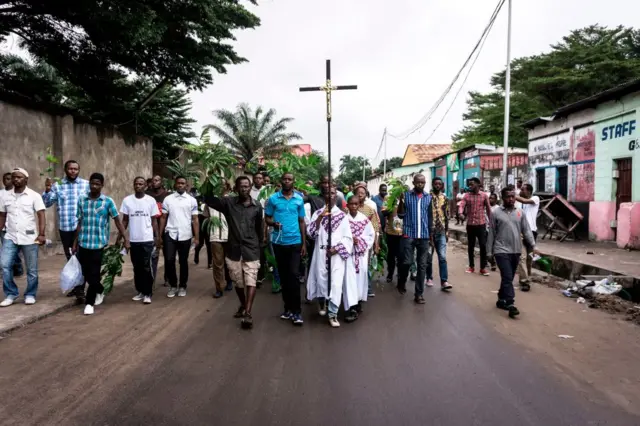 Image source, Getty Images
Image source, Getty ImagesThe Church pushed for elections in DR Congo
The Church may now be publicly doubting the results but it will be very wary of any public demonstrations because it knows from the experience of past crackdowns that leading people onto the streets can have tragic consequences.
The security forces have used live ammunition as well as tear gas and beatings during previous protests.
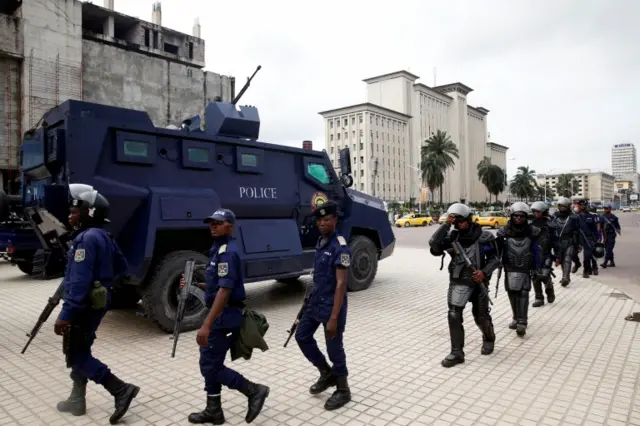 Image source, Reuters
Image source, ReutersPolice have maintained a strong presence in the capital, Kinshasa, to prevent unrest
In the Democratic of Congo's capital, Kinshasa, supporters of opposition politician Felix Tshsekedi are ecstatic following his victory in the presidential poll, as these photos of show:
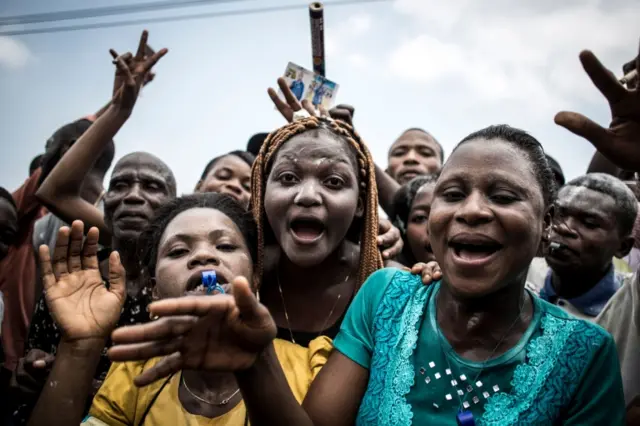 Image source, AFP
Image source, AFP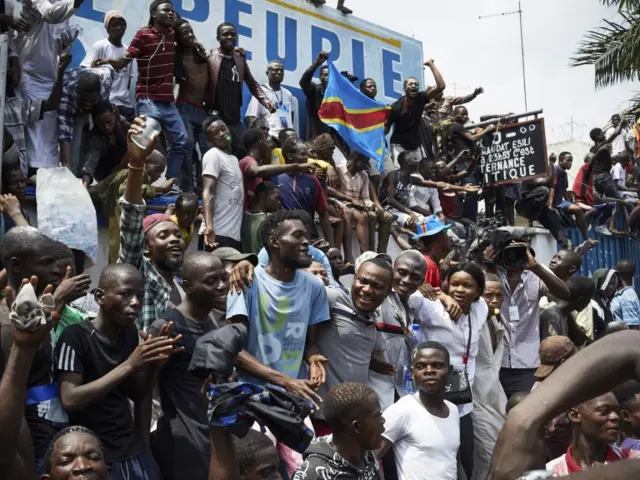 Image source, AFP
Image source, AFP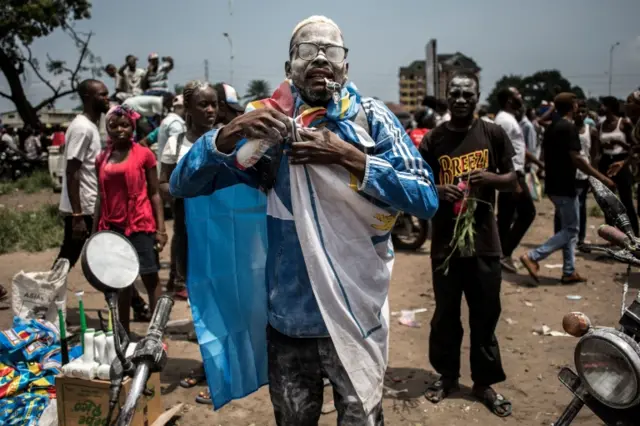 Image source, AFP
Image source, AFPTwo police officers and two civilians have been killed in the Democratic Republic of Congo's south-western city of Kikwit following protests over opposition candidate Felix Tshisekedi's victory in the presidential election, AFP news agency quotes police as saying.
"In the operation to restore public order today [Thursday] in Kikwit, two policemen and two civilian were killed. We also recorded 10 wounded," city police chief General Dieudonne Mutepeke told AFP.
Opposition candidate Felix Tshisekedi has won the presidential election in the Democratic Republic of Congo, electoral officials say.
The announcement, made overnight, sparked accusations of an "electoral coup" from runner-up Martin Fayulu.
The Catholic Church said that the result did not match data collected by its election monitors.
BBC Africa's video unit has captured all the drama:
DR Congo presidential election: Joy and dismay as Tshisekedi named winner
A prominent human rights campaigner has tweeted that it's time to salute the wide range of groups which forced President Joseph Kabila to hold the election:
Allow X content?
This article contains content provided by X. We ask for your permission before anything is loaded, as they may be using cookies and other technologies. You may want to read X’s cookie policy, external and privacy policy, external before accepting. To view this content choose ‘accept and continue’.
Mr Kabila's mandate ended two years ago, but the poll was repeatedly delayed until it finally went ahead on 30 December.
Opposition groups staged a series of protests to push the electoral commission to organise the election.
Some of the protests were brutally crushed by the security forces.
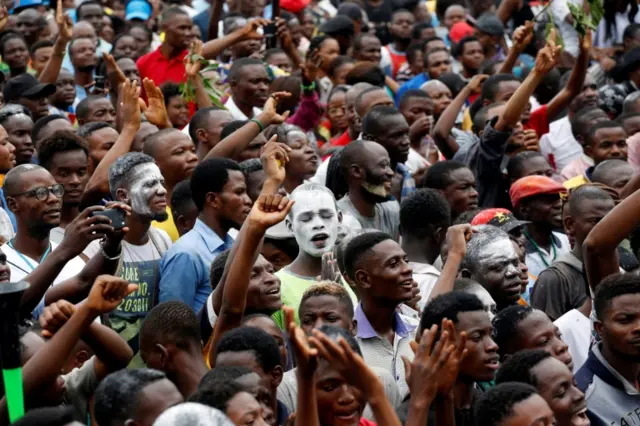 Image source, Reuters
Image source, ReutersThis is the first time an opposition candidate has won the presidency in DR Congo
Voters suspect a stitch up, external - that's the headline for an article in the influential UK-based Economist publication following the declaration of Felix Tshisekedi as the provisional winner of the Democratic Republic of Congo's presidential election.
It wrote:
Quote MessageThe declaration marks the end of the ruling party’s long stay in power and means that President Joseph Kabila and his preferred successor must admit defeat.
Quote MessageBut many voters think they have been cheated nonetheless. Mr Tshisekedi was not the man tipped to win.
Quote MessageCritics say that Mr Kabila was desperate to keep Mr Fayulu away from the throne because he was backed by two of the president’s biggest adversaries [Moise Katumbi, a businessman, and Jean-Pierre Bemba, a former warlord, who were both barred from standing].
Quote MessageMr Fayulu appeared to represent real change. He had campaigned on a promise to reduce corruption and enforce the rule of law - an obvious threat to those who have looted this giant, mineral-rich country for decades.
Quote MessageMr Tshisekedi, by contrast, is thought less likely to shake things up, or to ask awkward questions about Mr Kabila’s business empire and the dazzling wealth of his cronies."
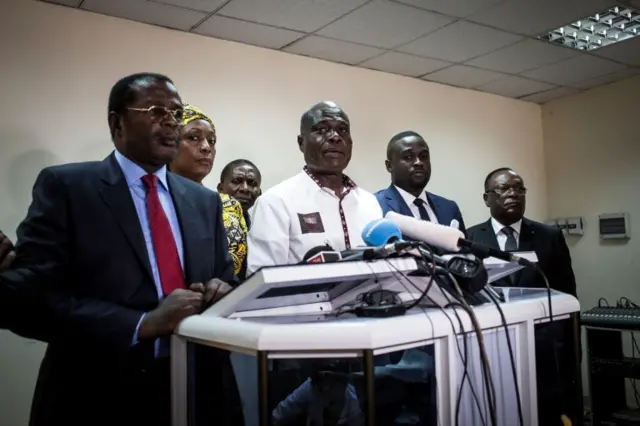 Image source, AFP
Image source, AFPMartin Fayulu (C) led in opinion polls
The result of the Democratic Republic of Congo's presidential election was "invented and fabricated in dark rooms" of the ruling coalition, defeated opposition candidate Martin Fayulu has said, reports BBC Afrique.
Mr Fayulu - who lost to another opposition candidate, Felix Tshisekedi - added:
Quote MessageThese results have nothing to do with the truth from ballots. This clearly is an unacceptable electoral scam, aiming at creating general chaos all over the country.
Quote MessageWe cannot accept that the will of our people is not respected."
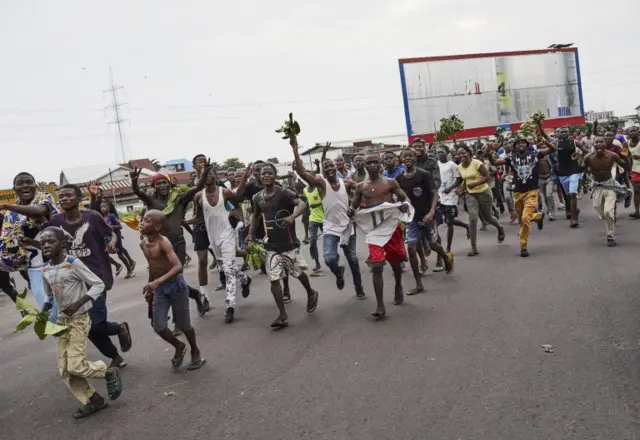 Image source, EPA
Image source, EPAFelix Tshisekedi's supporters believe history has been made
In his reaction, Mr Tshisekedi promised to be the president of the entire nation.
He heaped praise on President Joseph Kabila, whose preferred successor, Emmanuel Shadary, got fewer votes than both opposition candidates.
Mr Tshisekedi said:
Quote Message"No-one could have imagined such a scenario whereby an opposition candidate would emerge victorious."
Quote MessageI pay tribute to President Joseph Kabila and today we should no longer see him as an adversary, but rather, a partner in democratic change in our country."
The next president of the Democratic Republic of Congo takes over one of the richest countries in Africa - and will hold our fate in his hands because we rely heavily on its mineral resources.
In fact, the central African state is central to the boom in electric car sales.
Among a wealth of other metals, DR Congo is thought to have more than half of the world's supply of cobalt - an essential ingredient in the batteries that power electric vehicles and mobile phones.
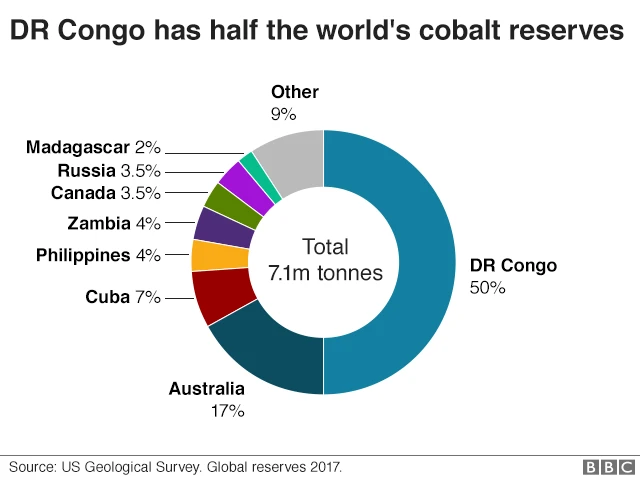
In theory, the reserves of cobalt and other minerals like diamonds, copper and gold, should make DR Congo one of the richest countries in Africa, but its people are among the poorest.
DR Congo has been exploited for its wealth since the first European explorers arrived in the 15th Century.
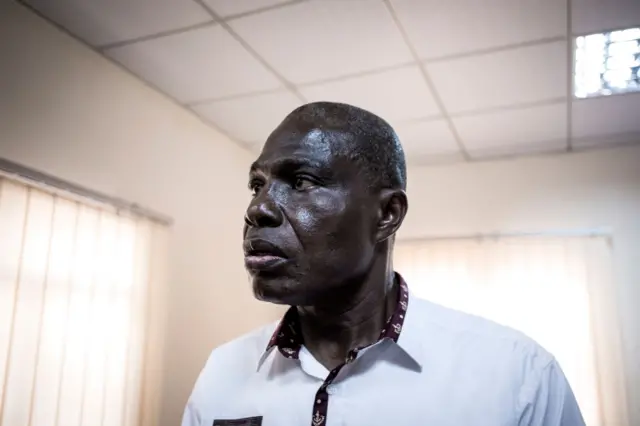 Image source, AFP
Image source, AFPFormer oil executive Martin Fayulu says he has been robbed of victory
The BBC World Service's Will Ross has reminded us that people in three key regions in the Democratic Republic of Congo are supposed to vote in March - and they could hold the balance of power.
The election commission had postponed voting in the eastern cities of Beni and Butembo, citing a deadly Ebola outbreak as one of the reasons for the decision.
People in Yumbi in the west also did not vote on 30 December, with officials saying unrest in the region made it difficult to hold elections there.
Our reporter has tweeted:
Allow X content?
This article contains content provided by X. We ask for your permission before anything is loaded, as they may be using cookies and other technologies. You may want to read X’s cookie policy, external and privacy policy, external before accepting. To view this content choose ‘accept and continue’.
The provisional results were:
The result can be challenged in the courts.
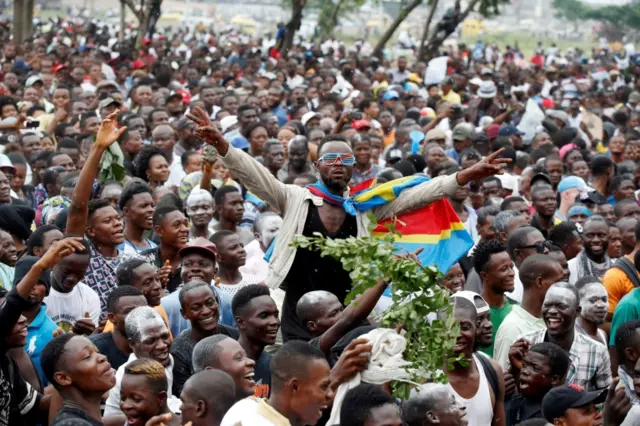 Image source, Reuters
Image source, ReutersThe opposition has never before won a presidential election in DR Congo
The African Union (AU) has called for the dispute over the presidential election result in the Democratic Republic of Congo to be resolved amicably.
AU commission chief Moussa Faki Mahamat said in a statement:
Quote MessageIt is important that any disagreement over the proclaimed results, notably that they did not reflect voters' wishes, be resolved peacefully, by turning to the relevant laws and through political dialogue between the parties involved."
Security forces opened fired early on Thursday after crowds attacked symbols of government in the Democratic Republic of Congo's south-western Kikwit city, which is 500km (310 miles) from the capital, Kinshasa, Reuters news agency reports.
At least two people died in the melee, it quoted a local journalist and a UN source as saying.
Supporters of defeated opposition candidate Martin Fayulu also protested in the north-eastern town of Kisangani, Reuters reported.
The BBC's Piers Scholfield has tweeted a video of the mood outside the headquarters of Felix Tshisekedi, the provisional winner of the Democratic Republic of Congo presidential election:
Allow X content?
This article contains content provided by X. We ask for your permission before anything is loaded, as they may be using cookies and other technologies. You may want to read X’s cookie policy, external and privacy policy, external before accepting. To view this content choose ‘accept and continue’.
Fergal Keane
BBC Africa editor, Kinshasa
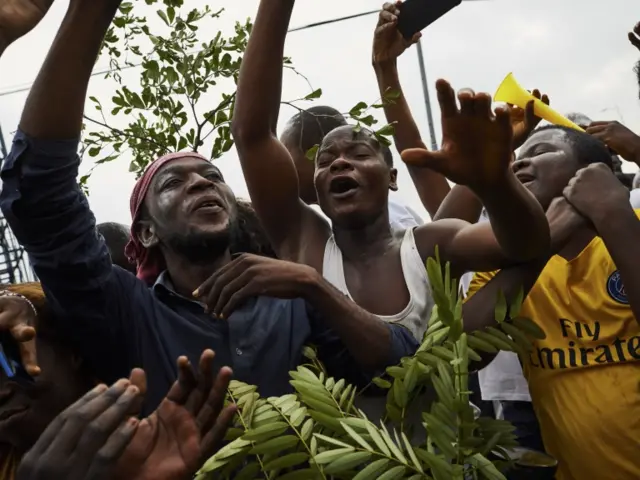 Image source, EPA
Image source, EPAFelix Tshisekedi's supporters are jubilant after he was declared the winner
The Roman Catholic Church in the Democratic Republic of Congo is now publicly doubting the provisional results from the 30 December presidential election.
Abbe Donacien Nshole said the figures released by the electoral commission did not match what had been gathered by the church's own observers.
This statement was followed by loud cheers at the press briefing.
The church had 40,000 observers across the country during the poll and earlier briefed diplomats that the other opposition candidate, Martin Fayulu, had won the election.
However, the church will be very wary of any public demonstrations and Abbe Nshole appealed for calm and maturity from the electorate.
There have been scenes of enthusiastic celebration by hundreds of people at the headquarters of Felix Tshisekedi - the winning candidate.